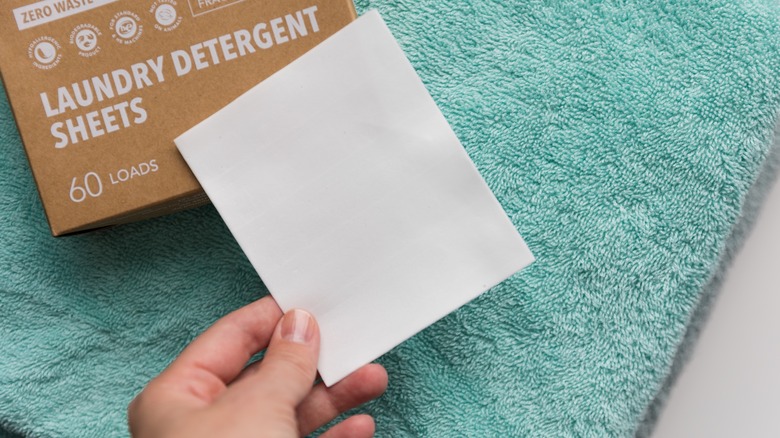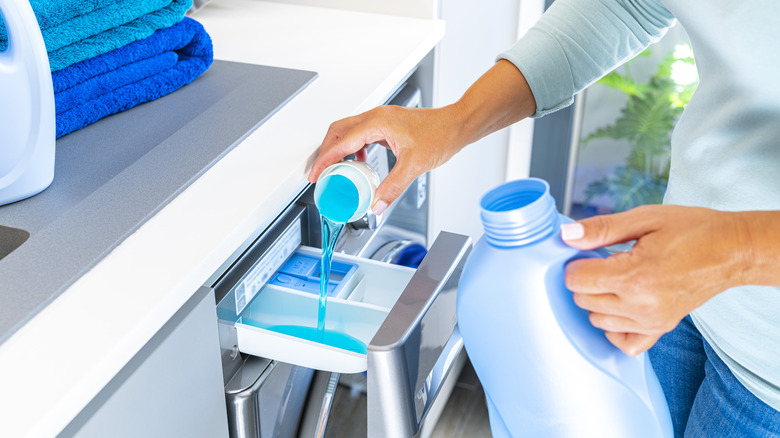The Hidden Downsides Of Using Laundry Detergent Sheets
As we shift toward a more sustainable world, individuals may opt for detergent sheets over traditional laundry detergent for several compelling reasons. First, detergent sheets are seemingly more convenient and mess-free. They come in pre-measured, easily dissolvable sheets, eliminating the need for measuring and the risk of spillage. Additionally, detergent sheets appear to be more environmentally friendly. They often have reduced packaging, leading to less plastic waste compared to bulky liquid detergent bottles. Additionally, their concentrated form requires less water for production and transportation, reducing their overall carbon footprint. What's true is that detergent sheets are space-efficient. They occupy less storage space compared to large detergent bottles, making them ideal for individuals with limited storage areas.
Consequently, these benefits are typically marketed as reasons why individuals should choose the novel detergent sheet over traditional liquid detergent. That said, there are indeed drawbacks to using detergent sheets that may not be obvious to the average consumer. Many of the detergent sheets are subscription-based, which can make it difficult for some to purchase them. Amazon and its wide range of products makes it easier to buy these products, but many of them are still not available in stores. Moreover, the sheets can be more expensive than liquid detergents, especially when the latter frequently go on sale at local grocery stores or have available coupons. So, you may want to think twice before investing in these new-fangled products.
The downsides of laundry detergent sheets for your clothes
Using laundry detergent sheets instead of liquid detergent has several drawbacks, particularly when considering their impact on your clothes and linens in the wash. One significant issue is that laundry detergent sheets may not dissolve completely in all water temperatures. Unlike liquid detergents, which easily mix with water, sheets may leave residue on your clothes if they don't dissolve entirely. This residue can lead to stains, spots, or a general dullness in your garments' appearance. Moreover, incomplete dissolution can cause uneven distribution of the detergent, resulting in some parts of your laundry receiving insufficient cleaning; others may be exposed to excessive detergent, potentially leading to fabric damage or fading over time.
Another drawback of using detergent sheets over traditional liquid detergents is their inadequate cleaning power. Liquid detergents typically contain a variety of enzymes and cleaning agents designed to tackle different types of stains and soils effectively. In contrast, detergent sheets have limited space for these active ingredients, making them less effective at removing tough stains and odors. This can be especially problematic for heavily soiled items or clothes with stubborn stains, as you may need to use additional products or pre-treat stains separately, adding complexity and time to your laundry routine. So, while laundry detergent sheets may offer convenience, portability, and increased sustainability, they ultimately yield negative outcomes for your clothes and linens in the wash.
Other drawbacks of using laundry detergent sheets
One significant concern when choosing laundry detergent sheets is the potential for environmental harm. While most laundry detergent sheets are packaged in paper instead of plastic, they likely contribute more plastic waste than expected. This is because the substrate used in laundry detergent sheets consists of polyvinyl alcohol (PVA or PVOH), which is also used to make plastic-covered dish pods and gets released into wastewater as microplastic particles. Although the environmental impact of PVA isn't entirely understood, studies have identified it as potentially harmful to plants and aquatic life and largely resistant to traditional wastewater treatment measures.
Another drawback of laundry detergent sheets is their limited versatility. Liquid detergents come in a variety of formulations, including specialized options for different washing machines, fabrics, and laundry needs. Meanwhile, detergent sheets typically offer a one-size-fits-all approach, lacking the flexibility to cater to specific washing requirements and types of stains. This can be limiting for individuals with sensitive skin, allergies, or specific laundry needs, as they may not find detergent sheets that address their concerns.
Furthermore, the convenience promised by detergent sheets may be compromised if they become moist or exposed to humidity, as this can cause them to stick together or degrade in quality. This proves difficult since some of these sheets come in paper packaging and are prone to damage if packaged near liquid sources. Should you encounter humidity or spills, the detergent sheets will prove useless.


